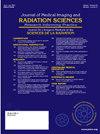Evaluating if Pre-Treatment Education Is Meeting the Needs of All Radiation Therapy Patients
IF 1.3
Q3 RADIOLOGY, NUCLEAR MEDICINE & MEDICAL IMAGING
Journal of Medical Imaging and Radiation Sciences
Pub Date : 2025-05-01
DOI:10.1016/j.jmir.2025.101929
引用次数: 0
Abstract
Purpose/Aim
Pre-treatment radiation therapy education has been shown to support patients, reduce their anxiety and even improve their satisfaction with overall cancer care. Numerous approaches have been tested including self-directed learning with written pamphlets or videos, or 1-on-1 with a Radiation Therapist in-person or videoconferencing. As telephone-based patient education has been implemented since the COVID-19 pandemic, the aim was to evaluate if radiation therapy patients’ information needs are being achieved.
Methods/Process
As part of standard care, all patients received a 30-minute telephone consultation with a Radiation Therapist prior to their CT-simulation to review what to expect during their specific treatment course. For this prospective study approved as quality improvement, at CT-simulation patients were offered a questionnaire about the telephone consultation with implied consent for those who completed it. The 21-item questionnaire was designed to capture patients’ satisfaction with the information they received over the telephone (Likert-scale, 7 items), their preferences (e.g. timing/scheduling, in-person vs virtual modalities, mandatory vs optional) and demographic questions. Data was analysed with descriptive statistics and relationships between subgroups were explored with post-hoc tests (Chi-square, T-test, ANOVA).
Results or Benefits/Challenges
Over two months 312 patients returned the survey, of which 278 were completed and included in this analysis. Overall mean Likert-scale scores were 4.10 (standard deviation 0.75) indicating patients agreed/strongly agreed the session help them prepare, new and sufficient information was provided, and they were comfortable speaking on the phone. Majority responded that the 30 min length (90.0%) prior to CT-simulation (60.4%) was optimal and that it should be mandatory (65.4%). Regarding modalities, 61.4% preferred the telephone (vs in-person, videoconferencing, etc.), although 52.5% indicated they would like additional information in short digital videos. There were consistent trends for those with lower education levels to report lower satisfaction, and they were significantly less comfortable receiving information over the telephone (p< 0.05). More first-time patients versus those returning for re-irradiation indicated the session should be mandatory (71.1% vs 52.2%, p= 0.011), instead of optional. No other significant differences were observed by subgroup based on cancer type, age, gender, or race/ethnicity (p > 0.05).
Conclusions/Impact
Patients reported overall that a pre-treatment telephone consultation with a Radiation Therapist provided them with new information that helped them prepare for radiation therapy. Results also indicate that a sizable minority of patients may benefit from tailored approaches for their level of comprehension, prior medical experience and preferred learning styles. Optimally resources would be directed to radiation therapy patients with unmet needs in the future
评估治疗前教育是否满足所有放射治疗患者的需要
治疗前放射治疗教育已被证明可以支持患者,减少他们的焦虑,甚至提高他们对整体癌症治疗的满意度。已经测试了许多方法,包括通过书面小册子或视频进行自主学习,或与放射治疗师面对面或视频会议进行一对一的学习。自2019冠状病毒病大流行以来,一直在实施以电话为基础的患者教育,目的是评估放射治疗患者的信息需求是否得到满足。方法/过程作为标准治疗的一部分,所有患者在ct模拟之前都接受了30分钟的放射治疗师电话咨询,以回顾他们在特定治疗过程中的期望。对于这项被认可为质量改进的前瞻性研究,在ct模拟中,患者被提供了一份关于电话咨询的问卷,并对那些完成问卷的人进行了默示同意。21项调查问卷旨在了解患者对通过电话收到的信息的满意度(李克特量表,7项),他们的偏好(例如时间/安排,面对面与虚拟模式,强制性与可选性)和人口统计问题。用描述性统计分析数据,用事后检验(卡方检验、t检验、方差分析)探讨亚组之间的关系。结果或益处/挑战在两个多月的时间里,312名患者返回了调查,其中278名患者完成并纳入了本分析。总体平均李克特量表得分为4.10(标准偏差为0.75),表明患者同意/强烈同意会议帮助他们做好准备,提供了新的和充分的信息,并且他们对电话交谈感到舒适。大多数人回答说,在ct模拟(60.4%)之前的30分钟长度(90.0%)是最佳的,应该是强制性的(65.4%)。在方式方面,61.4%的人更喜欢电话(相对于面对面、视频会议等),尽管52.5%的人表示他们希望在短数字视频中获得更多信息。受教育程度较低的人报告满意度较低的趋势是一致的,他们通过电话接受信息的舒适度明显较低(p<;0.05)。第一次接受放射治疗的患者与再次接受放射治疗的患者相比,更多的患者认为放射治疗应该是强制性的(71.1% vs 52.2%, p= 0.011),而不是选择性的。基于癌症类型、年龄、性别或种族/民族的亚组未观察到其他显著差异(p >;0.05)。结论/影响总体而言,患者报告说,治疗前与放射治疗师的电话咨询为他们提供了新的信息,帮助他们为放射治疗做准备。结果还表明,相当一部分患者可能会受益于根据他们的理解水平、先前的医疗经验和首选的学习方式量身定制的方法。最佳资源将用于未来未满足需求的放射治疗患者
本文章由计算机程序翻译,如有差异,请以英文原文为准。
求助全文
约1分钟内获得全文
求助全文
来源期刊

Journal of Medical Imaging and Radiation Sciences
RADIOLOGY, NUCLEAR MEDICINE & MEDICAL IMAGING-
CiteScore
2.30
自引率
11.10%
发文量
231
审稿时长
53 days
期刊介绍:
Journal of Medical Imaging and Radiation Sciences is the official peer-reviewed journal of the Canadian Association of Medical Radiation Technologists. This journal is published four times a year and is circulated to approximately 11,000 medical radiation technologists, libraries and radiology departments throughout Canada, the United States and overseas. The Journal publishes articles on recent research, new technology and techniques, professional practices, technologists viewpoints as well as relevant book reviews.
 求助内容:
求助内容: 应助结果提醒方式:
应助结果提醒方式:


